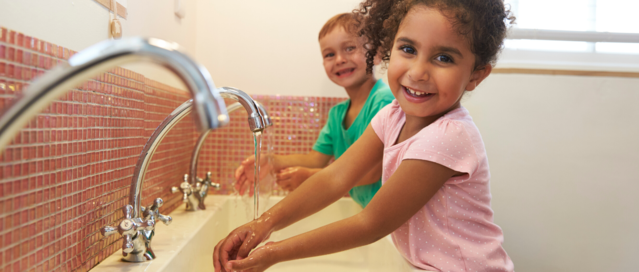Coronavirus Disease 2019
How to Talk to Kids and Teens About the Coronavirus
Plus comics, podcasts, and links to support your efforts.
Posted March 11, 2020 Reviewed by Kaja Perina
Even if children and teens don't appear to be following the virus news carefully, it is likely that they are absorbing the information and stress from adults. They are hearing about it from friends and making their own inferences about what it all means. Rather than leave this education up to siblings, the media, or friends, you play an important role in helping children and teens better understand what's happening and help them manage their own related worries or anxiety.

The World Health Organization officially declared coronavirus a pandemic. Health experts predict that the virus and its impact on our communities are just beginning. We can help our kids manage their stress and emotions as they live through this pandemic. Here are some tips for different age groups that can help:
Early Childhood
Even though babies and toddlers may not know what is going on, they may pick up a parent’s worry and anxiety with their “sixth sense.”
- Try to stay calm around babies and toddlers.
- Maintain normal routines as much as possible. Routines are reassuring for babies.
- Shield babies and toddlers from media coverage as much as possible.
- Look for non-verbal signs that your toddler may be anxious. This might include being scared to go outside or to daycare, extra weepy, clingy, or irritable. Provide extra reassurance and time together.
- Take the lead from your toddler. Don’t talk about it unless they show signs of distress or ask questions.
Preschoolers
Preschoolers may be more tuned in to what is happening. They may have questions about germs, doctors, and even death.
- Safety is a primary concern for this age group. Reassure them that adults are in charge and working to keep people safe, healthy, and secure.
- Preschoolers are also concerned about the health of parents, relatives, and friends. Reassure them that everyone is doing what they can to stay healthy and take care of others. Remind them that they can stay healthy by washing hands and make hand-washing fun with songs.
- Preschoolers are not always able to distinguish fantasy and reality. Limit media exposure.
- Look for non-verbal signs that your preschooler may be anxious. This might include being scared to go to preschool, extra weepy, clingy, or irritable.
- Bedtimes are very important. Stories, books, and tuck-ins are crucial.
- Try to maintain your children’s normal routines and rituals when possible. If school, daycare or events are canceled, try to create and stick to other routines when you can.
- Give them lots of hugs and physical reassurance and limit media coverage.
- Take the lead from your preschooler. Don’t insist on talking about it a lot unless they show signs of distress or ask questions.
Elementary School
School-age children will be more aware of what is going on. They have probably had discussions at school and with friends.
- Talk to your elementary age children. Explain what happened while reassuring them that you and your child’s teachers will do everything to keep them healthy and safe.
- Children this age are also concerned about their own health, as well as that of family and friends. For example, they may have heard that kids aren’t impacted by coronavirus but that older people are, triggering fears about grandparents. They may be worried about money if they know adults are off of work. Try to spend extra time together. This will provide extra reassurance.
- Don’t be surprised if they are more irritable and touchy. Be extra patient.
- Limit media coverage.
- Try to continue normal home routines, especially at bedtime. If routines are disrupted due to school or after school activity closures, explain that this is part of the precautions grown-ups are taking to prevent people from getting sick. It doesn’t mean that all of their teachers and friends are sick.
- If fear persists, point out all the things adults are doing to help and to prevent the virus from spreading. Children like to be helpful and feel like they can do something from hand washing to writing letters to nursing homes.
- Ask them if they have any questions. If they do, stick to the facts and tell them what you know without exaggerating or overreacting. Use these resources to help them learn more about the virus:
- "Understanding Corona Virus and How Germs Spread" – Brains On Podcast (plus a kid-centered series on news literacy called “Prove It.”)
- "Just for kids: A comic exploring the new coronavirus" – Minnesota Public Radio
Middle School
Children this age will be very aware of what is going on. They have probably seen news coverage and discussed the virus at school or with friends.
- Talk to your middle school children and answer any questions. This will help you determine how much they know and may help you correct any misinformation they might have.
- Acknowledge any feelings of anxiety, worry, or panic.
- Children this age will be more interested in what might happen in the future. Stick to the facts and don’t burden them with your own anxiety about uncertain dystopian scenarios.
- Some children may act out scary feelings through misbehavior. Others may become more withdrawn. Pay attention to these cues and ask them to tell you about their feelings.
- Talk to your kids about what they see on TV or read online and help them understand which sources are reliable and which aren’t when it comes to information about the virus.
- Talk about how events like this can surface harmful stereotypes and discrimination against certain people and populations. In this case, talk about the importance of disrupting anti-Asian sentiment and xenophobia in coverage of and response to the coronavirus.
- Seek out positive media. Watch, read, and share stories about ways people are responding to the virus in collaborative ways to keep communities safe.
- Help guide your child’s worry into things they can do – like learning more about how to prevent the spread of the virus including washing hands and getting enough sleep. Use these resources to spark conversations:
- "Understanding Corona Virus and How Germs Spread": Brains On Podcast (plus a kid-centered series on news literacy called “Prove It.”)
- "Just for kids: A comic exploring the new coronavirus": Minnesota Public Radio
High School
High school students have probably had conversations with their peers and teachers. They might have fears about what this will mean for their own health, schooling, schedule or safety.
- Questions about health, the economy, and public policy are all legitimate issues for this age group. It is important to discuss these topics with them if they are interested.
- Acknowledge any worry, anxiety or fear they have and remind them that these feelings are normal.
- Help guide your teen’s worry into things they can do – like learning more about how to prevent the spread of the virus including washing hands, getting lots of sleep, or making concrete plans of what you will do if work or school schedules are disrupted.
- Some teens may want to block out the whole thing. It may appear that they do not care. This might be masking real worries. Ask questions and be ready to listen.
- Some teens may make jokes. Humor can be a way to help them cope, but discourage them from using humor as the only way to talk about the virus.
- Stick to the facts in your conversations and talk to your teens about what they see on TV or read online. Point them towards reliable sources of information like the CDC website.
- Talk through the difference between going online to get informed versus media over-use that can fuel anxiety. Enforce a tech curfew at night and encourage them to take media breaks.
- Some teens may be very interested in discussing the political or economic implications of the pandemic. Engage them in learning and critical thinking about the coronavirus.
- Talk about how events like this can surface harmful stereotypes and discrimination against certain people and populations. In this case, talk about the importance of disrupting anti-Asian and xenophobic sentiment in coverage of and response to the coronavirus.
- Don’t use your teen to process your own anxiety. Reach out to other adults to process your fears about the virus or the economic disruptions that it is causing.


